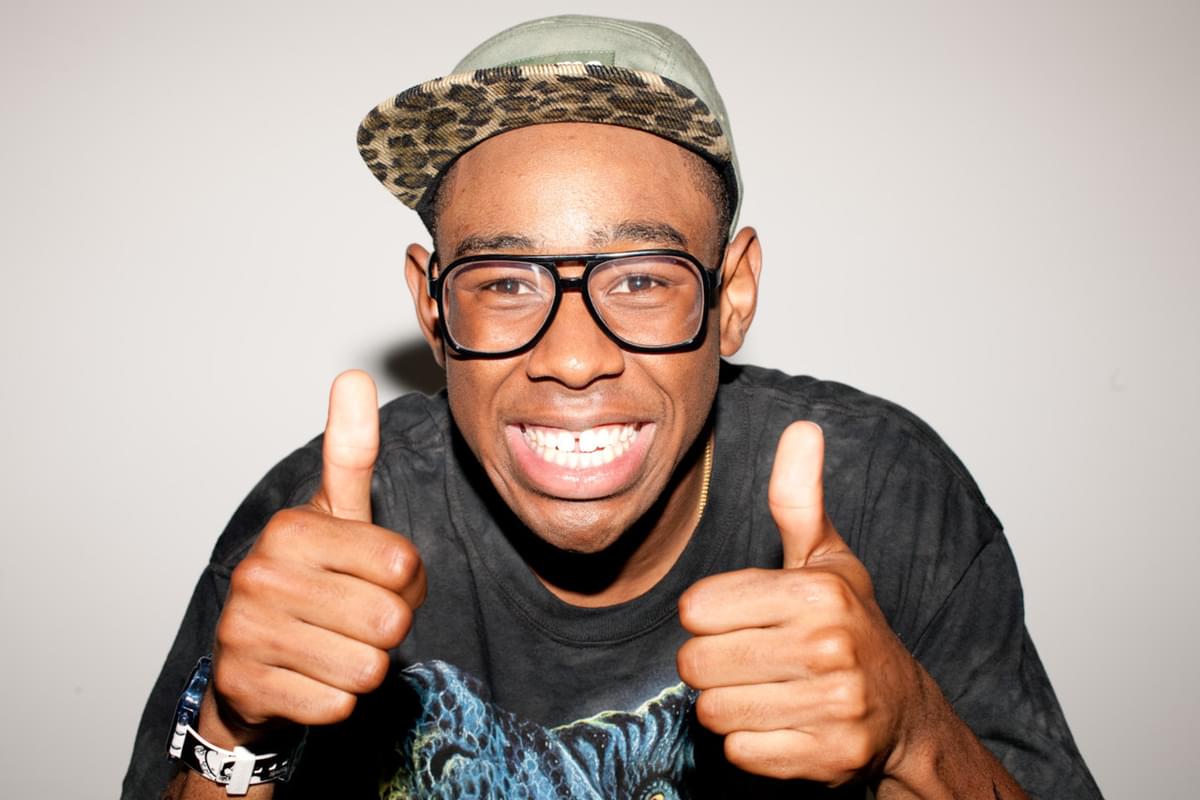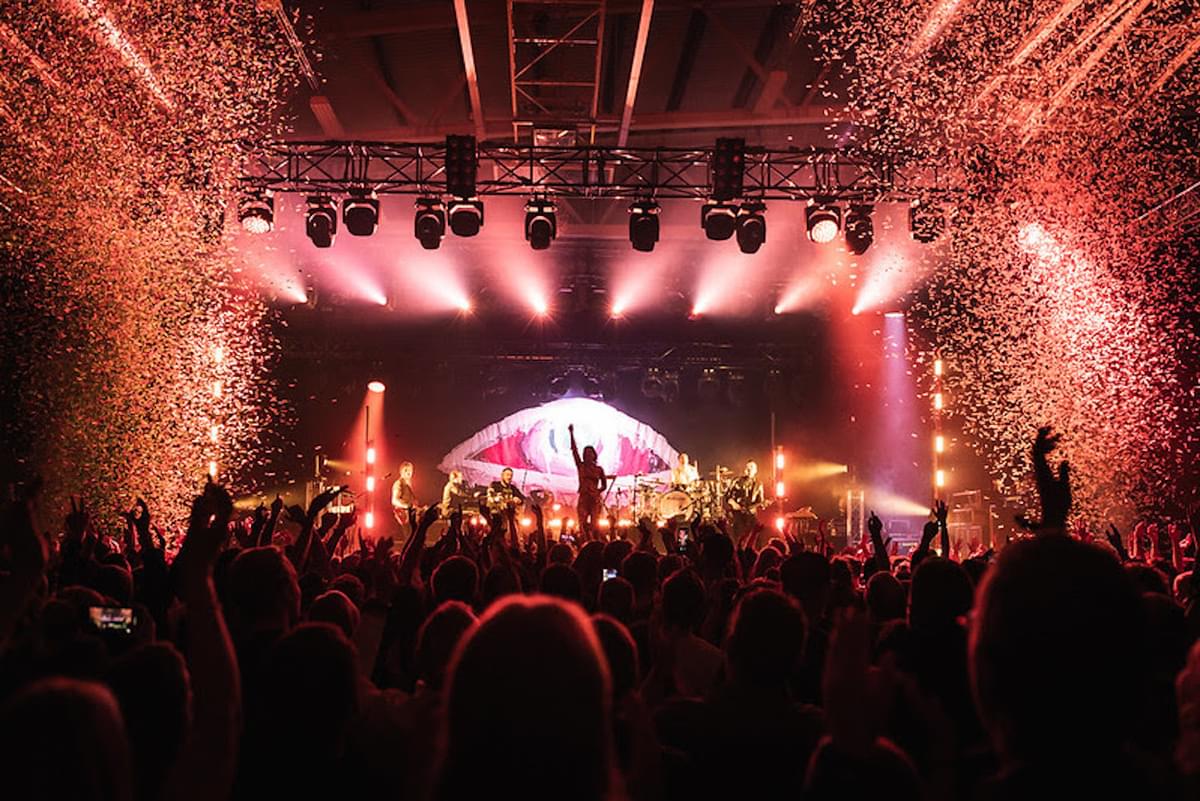
If anyone knows about the transformative power of music, it’s Dua Saleh.
The Sudan-born, Los Angeles-based R&B shapeshifter made their name with a pair of artsy EPs (2019’s Nür and 2020’s Rosetta), but their 2021 dance mixtape CROSSOVER marked a pivot. Written about sudden exposure and upward mobility, and armed with a bevy of collaborators like Amaarae and Chester Watson, Saleh concealed their feelings behind hard dance beats and mysterious, veiled poetry. For their debut album, however, they knew it was time to get real.
I SHOULD CALL THEM, out this Friday, is a slick, galactic set of alternative R&B whose intentions are clear: pure honesty. The album came together between stints of touring and two seasons acting on Netflix’s Sex Education, playing Cal Bowman, the show’s first non-binary character. “I felt momentous and inspired by the calibre of all that I was doing,” Saleh tells me from their home in Los Angeles. “I didn’t have time to second guess myself. There was so much happening in my life. I was experiencing a lot of raw emotions that were spilling out of me.”
Thanks to songwriters, reflection and therapy, Saleh was able to translate their “flowery words” into something more concrete and transparent. One CROSSOVER lyric goes “I can see the future through the falcon on my shoulder.” Compare that to the new LP, where they open one song, “Time and time again, save your voice and motions / Lovers of your past couldn't crack your form.” The poetry is still there, but now Saleh’s voice comes through.
One reason for this evolution is baked into the album’s title. I SHOULD CALL THEM is about an ex, and the pinpoint accuracy of their experience with that person allowed Saleh to fully investigate their own emotions. “Me being the lover that I am, it’s sometimes hard for me to process everything that I feel,” they say, “especially when in the midst of feeling enthralled by another being. The rawness of everything you experience divulges out of you. Whether you want it to or not. There was a lot of crying, being in my feelings, a lot of desire towards my ex, wanting to text her, wanting to be connected to her in some capacity. And then no time for me to overcompensate with responsibility. I was fully present, basically.” The art, then – whether it be songwriting or acting – was the balm.

Saleh’s craft has taken a lifetime to ferment. Each of the three places they have lived – Sudan, Minnesota and Los Angeles – has deeply influenced their musical identity. The vocal flourishes showcased on “want” and throughout the album come from Sudan, while Saleh’s love of funk and R&B comes from the hotspot cities of Minneapolis and St. Paul. But Los Angeles, they say, is a special kind of “art ecosystem” where up-and-coming and legendary musicians alike gather. Many of the collaborations on I SHOULD CALL THEM happened from simply being at the right place at the right time. Once, after losing their passport, Saleh was stranded in LA and met Ambré, who features on “television”. “[These artists] inspire you and help you hone in on your craft because you’re inspired by their skill level,” they say.
A big part of I SHOULD CALL THEM, and the Dua Saleh project as a whole, comes from looking into the broader culture, to the musical trends in flux and seeing what’s propagating. “Everyone is gravitating towards unsigned artists,” they say, regarding the wave of singers rising through grassroots means of self-promotion and finding your own people. Saleh counts Sudan Archives as a friend (“I think she’s a genius”) and mentions people like Brent Faiyaz, Muni Long and Orion Sun, seeing the power in tapping into queer and unaccessed talent that, in turn, is catalysing music’s biggest trends. Saleh stays informed, remaining “actively aware of where we’re naturally gravitating towards as an art collective,” saying that they often find songwriting inspiration within the community, “because it’s a sociological observation of music.”
As a result, the album is rich with texture, influences, and dappled with experimentation, so naturally baked in it might be difficult to recognise it at first glance. Though they mention the current nostalgia wave happening in their circles, with many artists pulling from ‘90s and 2000s R&B and avant-garde icons like Kate Bush, I SHOULD CALL THEM sounds inventively distinct.
Saleh is thoughtful and precise when it comes to genre work, even if it means the result as a whole defies categorisation. “playing games” puts an electronic spin on techno-R&B, its drum n’ bass subdued but present through the song; “unruly”, featuring serpentwithfeet, is electronic neo-soul, something Saleh says is “one of one”; but the album’s most thrilling moment comes right at the end, when “2excited” disperses into an angry, all-encompassing sound collage inspired by “cybertronic decay” and incorporating black metal (“I was actually screaming and jamming with people”).
Saleh plays outside of their box for the hell of it, leading to an eclectic but focused product. On no two songs do they sound the same, from the gentle coaxing of “unruly” and the Sid Sriram-starring “time and time again” to the high-grade confidence “coast”, co-signed by fellow LA-based artist Gallant. A lot of Saleh's groundwork informs the record in other ways that aren't easily perceived. For example, they write and often think in Arabic and Tigrinya, the Eritrean language, which they say broadens their brain but also allows for more inflection in their voice. “It was interesting to see what I could challenge myself with,” they say.
That act of interrogation lies at the heart of I SHOULD CALL THEM, with Saleh as a turning, twisting entity representative of the album’s dark and alluring pivots. I ask how identity plays a role in their art and am surprised when the answer is anime, but I suppose I shouldn’t be. The Japanese artform is full of individuals morphing and transcending their bodies in ways both horrific and stunning. “You’ll witness people physically changing their form in a way that’s inspirational and allows me to not be cemented in the Western understanding of my body,” Saleh says, citing Hunter x Hunter and Parasyte: The Maxim as examples.

In a recent tweet, post-presidential debate, Saleh jokingly called themself a "trans alien”. “I think saying, ‘My gender is swamp monster,’ or ‘I’m a transgender alien who got surgery in prison' or something is me making light of the weight of gender when it comes to my experience with it, and the gravity of gender suppression from society writ large,” they say. Even something as (seemingly) trivial as anime or a disgraced former president’s unhinged comments can offer relief, if only for a bit.
I SHOULD CALL THEM is sneakily deep. Not only is it an album about an ex, but it’s also conceptualised in an end-of-times dystopia. And not only that, but the world Saleh envisions is similar to our own – one in which climate change has wrecked our capacities for connection and have left humans clinging onto one another in their wake.
Saleh has been into futurism lately, particularly Octavia Butler’s prescient Parable of the Sower. Throughout our conversation, they bring up a litany of events we’ve both been privy to as young adults in America that we often feel powerless in the face of: the heatwaves in Los Angeles, earthquakes in New York, the hurricanes ravaging Puerto Rico, forest fires in Northern California, and pipeline bursts destroying Indigenous land. Even flooding in Wales when they were abroad filming Sex Education. Not long after our conversation, two new natural disasters have arisen, with Hurricane Helene’s destruction of North Carolina and Hurricane Milton about to hit my home state of Florida. And it will likely only get worse. “There’s a lot of warning signs that are being set in place, and some of them are sweeter to us,” says Saleh.
“My relationship with the Earth came with environmental destruction,” they explain. “Being displaced from Sudan, having to move as a result of the proliferation of weaponry and the destruction of my Indigenous land. There was a little bit of toxicity in that.” Despite the history of oppression they’ve been aware of from a young age, Saleh hasn’t lost their spark. “I fell in love with Earth when I was born, as all of us have, because that’s how we breathe life,” they say. In this way, I SHOULD CALL THEM could be a Band-Aid or a warning.

It’s a striking balance that Saleh reaches, to craft a project that can be read as one thing but promise another. I came into the conversation having listened to a breakup album and left recognising its portrait of a climate-ravaged world – the record’s second skin or parallel identity of sorts, expressed not only through Saleh’s lyricism and references but also through the musical techniques in communion within. When we talk about the litany of sub-genres and vocal stylings present on the album – “2excited” in particular – they mention, “having all of those come into place is reflective of how I want people to break through the barriers they’ve set for themselves in thinking about the environment, in a way.” It’s an optimistic but deeply thoughtful notion, that the physical texture of the music can reach up and influence the narrative.
Like many of us, Saleh has their qualms about, well, existing. “I’m actively participating in destroying the Earth, just by living in the Western world. In the end, right now, I’m grasping for straws as the Earth is decaying, as the water levels are rising, as fires are everywhere, and I’m trying to hold onto her as best as I can. I’m witnessing the end of the world,” they say. “It’s a bit apocalyptic, but it’s also just an R&B album. It doesn’t have to be that profound.”
It can be both, I say, and Saleh agrees. We can see it as one thing or the other, or as some form of dialogue or disconnect between the two. And does it really matter if you’re enjoying the music anyway? “It depends on who you are and what you need,” they say. “I think anybody can come in and take a sip of nectar from the album. We’re all hummingbirds, getting exactly what we need from music in general. I hope you’ll get that when the album’s in full bloom.”
I SHOULD CALL THEM is out 11 October via Ghostly International.

 1 month ago
12
1 month ago
12


















 English (US) ·
English (US) ·